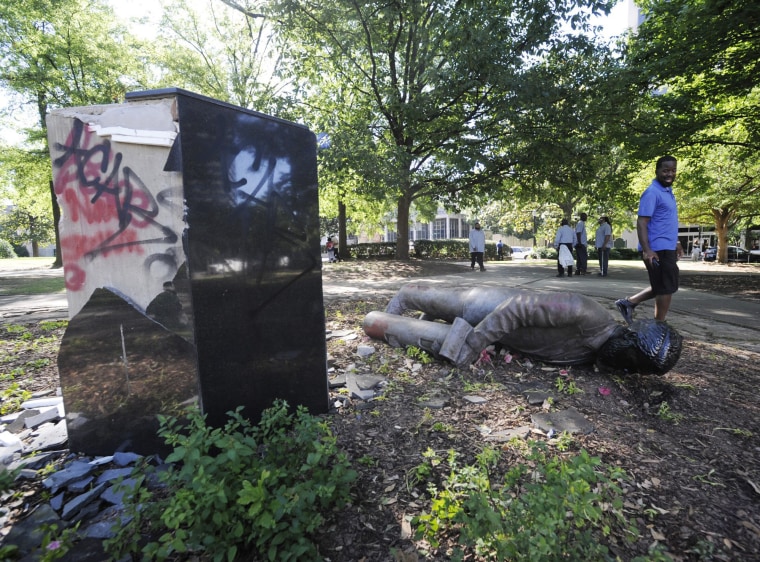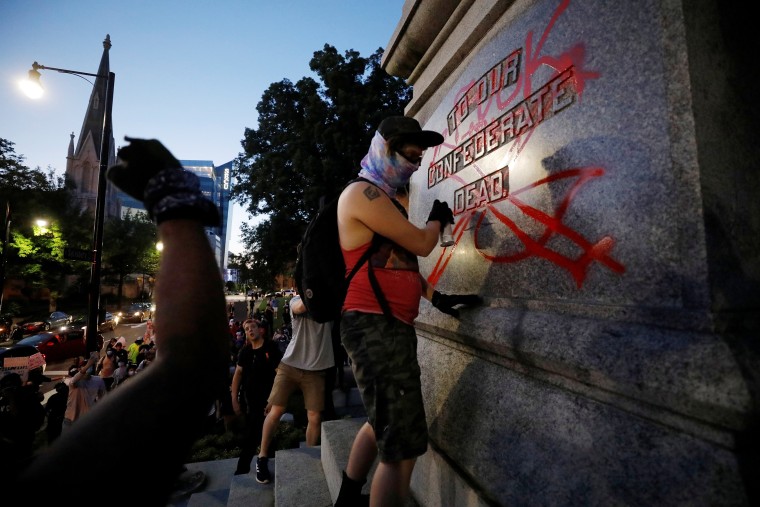The symbolism wasn't lost on residents of Birmingham, Alabama: On Monday, as state officials commemorated Confederacy leader Jefferson Davis as part of an annual state-recognized holiday, the majority-black city began the process of removing the Confederate Soldiers and Sailors monument from a public park.
But the action, initiated by Birmingham Mayor Randall Woodfin, will likely come at a cost.
Full coverage of George Floyd’s death and protests around the country
On Tuesday, state Attorney General Steve Marshall filed a civil lawsuit against the city, writing the move required a waiver, and without one, it has violated Alabama's monument preservation law. As such, Marshall wrote, the city is on the hook for a $25,000 fine, which would go to the state Historic Preservation Fund.
Marshall said in a statement that he warned Woodfin that the monument's removal from Linn Park "would violate the law and that I would fulfill my duty to enforce it."
The memorial, dating back 115 years, had been defaced during protests Sunday night in Birmingham — part of the larger nationwide unrest following the death of George Floyd, a black man, in Minneapolis police custody on Memorial Day.

Woodfin said Wednesday on the "TODAY" show that he made a promise to the protesters to dismantle the monument in 24 hours, which he did, in order to cool down growing tensions.
"I chose my city to avoid more civil unrest," Woodfin said, adding that "it's probably better for this city to pay this civil fine than to have more civil unrest."
He said that while he has received personal threats, he won't bow down to pressure from people who are celebrating a "revisionist history."
"It's important to note that the city of Birmingham wasn't even a city during the Civil War," Woodfin said. "We don't have time to worry about something that's not working for our city and relegates black people to property and slavery. It's important that we take this down and move forward."
But during these widespread demonstrations, Birmingham isn't the only city faced with how to deal with what some consider outdated and racist relics of the past that are out of touch with modern-day America.
Early Tuesday, the statue of a Confederate soldier in an intersection of Alexandria, Virginia, was removed by its owner, the United Daughters of the Confederacy. The removal had been planned for July, NBC Washington reported, but "given events, they accelerated it," Mayor Justin Wilson said.
He tweeted that "Alexandria, like all great cities, is constantly changing and evolving."
The United Daughters of the Confederacy did not immediately return a request for comment. Its offices in Richmond were reportedly burned early Sunday during protests. Also in the city, messages of "No More White Supremacy" and "Black Lives Matter" were written on a statue of Confederate Gen. Robert E. Lee.
On Tuesday night, elected officials in Rocky Mount, North Carolina, an hour east of Raleigh, voted to remove a marble monument honoring Confederate soldiers from a city park, NBC affiliate WRAL reported.
The state capitol grounds in Raleigh saw a Confederate statue defaced with anti-racist and anti-police messages, as well.

In recent days, statues were also reportedly vandalized in Chattanooga, Tennessee; Norfolk, Virginia; Charleston, South Carolina and at the University of Mississippi.
And while not a Confederate symbol, a 10-foot statue of the late Philadelphia Mayor Frank L. Rizzo was removed Tuesday from the front of the municipal services building. Rizzo's statue had been vandalized during recent protests, and many, including Mayor Jim Kenney, have denounced his legacy as one that espoused racist and bigoted views.
Download the NBC News app for full coverage and alerts on this story
In 2017, when a deadly white nationalist rally in Charlottesville, Virginia, reopened wounds and a national conversation about America's hostile racial history, cities such as Baltimore, New Orleans and Los Angeles saw a reckoning over Confederate monuments and memorials.
At the time, President Donald Trump railed against removing what he called "beautiful" Confederate statues and monuments, tweeting that it was sad to see the "history and culture" of the country being "ripped apart."
While the United Daughters of the Confederacy had come out against "certain hate groups," its leadership has argued that Confederate memorials and monuments affirm "part of our shared American history and should remain in place."
But Adam H. Domby, in his 2020 book "The False Cause: Fraud, Fabrication, and White Supremacy in Confederate Memory," tackled how the issue of "fabricated narratives" about the cause of the Civil War, the Reconstruction era and slavery still undermine the hope for racial equality today.
"Ironically, exaggerations, narrative arcs, tales, and falsehoods similar or identical to those that ex-Confederates used to justify white supremacy in 1913 are now used by monument supporters to try to detangle the Confederacy from accusations of racism," Domby, an assistant professor of history at the College of Charleston, wrote.
He told NBC News that the Confederate monuments have enduring ties to white supremacist ideology and that people still trying to protect them are feeding into a larger anti-democratic movement. He added that it's interesting to see groups such as the United Daughters of the Confederacy agree to take down monuments in this climate of reexamining systemic racism.
But "the real shift happens when monuments come down in red strongholds," Domby said.
